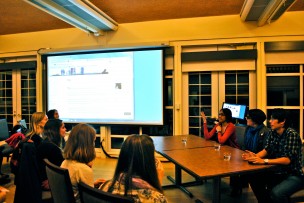
Last Tuesday night, students journeyed to the third floor of Allbritton to listen to a panel of three students—Aditi Shivaramakrishnan, Ana Begazo, and Nicholas Quah, all seniors—discuss their experiences keeping travel blogs during their semesters abroad.
The talk was sponsored by The Shapiro Creative Writing Center and organized by Writing at Wesleyan. Ford Fellows Katherine Mechling and Anya Backlund ’11 and Shapiro Center/Russell House Arts Fellow Barbara Fenig ’11 served as hosts. The event was the second panel (last week’s was on food writing) in what will hopefully become a semi-annual series.
“We’ve been organizing our events around particular themes to engage student writers working in niche genres,” Mechling explained. “There is a lot of fantastic writing happening on campus that we are trying to showcase. A panel seemed like a great way to start the conversation.”
The hour-long talk offered a lively dialogue as the panelists spoke about their experiences abroad and the way in which they chronicled them.
“When I was younger, I always took a little notebook with me when my family traveled somewhere, and would write in it each night,” said Shivaramakrishnan, an English major who studied in London last semester.
Begazoa, a Russian and Eastern European Studies major who studied in St. Petersburg, explained that she initially used her blog to communicate with family and friends.
“I didn’t want to write 50 emails to people, so I figured I would just do a blog,” Begazo said. “I also came up with a name for it that I wanted to use: ‘Notes from the Undergrad.’ Sorry, Russian nerd joke.”
All three agreed that their blogs evolved into a record for their adventures and experiences abroad.
“A lot of times, you write about random shit that happens when you are abroad, because when you’re abroad, random shit does happen,” Quah said. “If you don’t write an account, you won’t remember it. And I wanted to remember certain things.”
The audience consisted of an unusual amalgamation of people. Several seemed to be planning on going abroad and wanted advice on how to document their experiences, if at all.
“Blogging motivated me to go out and take advantage of numerous opportunities, and it’s a fun challenge to find affordable activities, especially in London,” Shivaramakrishnan said. “I don’t think blogging can ever necessarily convey the full impression of what one’s travel experience was like, and realizing that was freeing, in a sense.”
According to Quah, it is important to keep the goal of your post in mind as you write.
“If you want to write for the purpose of making a good reflection or connection to the readership, you have to think about the real thing you want out of the conversation,” Quah said. “Just remember that the game is to convey as succinctly and poetically as possible.”
Shivaramakrishnan and Begazo both had reservations about putting racy material online, and confessed to “cleaning up” their posts for various reasons. Quah, on the other hand, was adamantly opposed to this method of blogging.
“If you want to have a blog for your parents and yourself, you should think about making two different blogs,” he said. “Self-censorship really stops you from being honest, and I think honest is what good writing should be.”
In a later interview with The Argus, Shivaramakrishnan proposed other reasons why one would feel compelled to censor their blog.
“Since this was the first time I was consciously blogging for an audience, I was more concerned with issues of anonymity,” she said. “For example, should I post pictures of myself and share details like the school I go to, where I’m from? If I didn’t, would people get bored just looking at anonymous photos of European monuments?”
This issue brought the panel to another contentious question: should writers carefully revise blog posts, or tend towards more of a stream-of-consciousness style? The panel all had very strong opinions on the matter.
“I am narcissistic enough to read my own blog, yes,” Shivaramakrishnan admitted.
Quah, once again, had a completely different attitude.
“I’m pretty neurotic about these things; I never read my own work,” he said. “Once it’s posted, I’m done.”
Overall, the panel had positive things to say about their experiences blogging and traveling abroad, and the audience seemed to walk away with a similar sentiment.
“I like that I have a record of it,” Begazo reflected. “Now, when I think about my time in St. Petersburg, I can scroll through the highlights. And if someone asks about a specific time, I now have this equivalent to a home video that I can show them.”
The panel concluded by encouraging anyone going abroad to consider writing a blog.
“If you choose to go abroad, definitely consider documenting your experiences—whether personally or for an audience, whether online or in a journal,” Shivaramakrishnan said. “Such documentation might spark off a future creative project.”


Leave a Reply